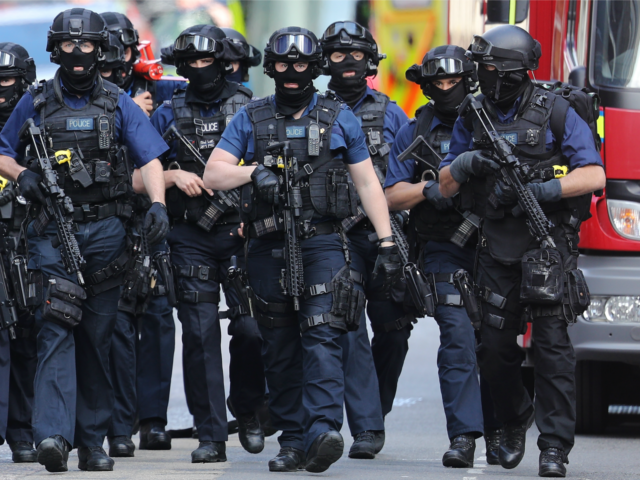Britain’s Security Service (MI5) will give the identity of terror suspects to police officers, teachers, and social workers in a bid to stop plots and deter extremism, the Home Secretary announced Monday.
The ‘Contest’ strategy would see some intelligence information handed down to local authorities in an effort to support the management of security risks, in changes which Home Secretary Sajid Javid said would “broaden the system to flag up when those people are behaving suspiciously”.
The new strategy comes after a number of terrorists engaged in last year’s summer of terror turned out to be known to MI5 but not under active investigation — specifically the March 22nd Westminster attacker Khalid Masood, the May 22nd Manchester Arena suicide bomber Salman Abedi, and at least one of the attackers from the June 3rd London Bridge and Borough Market vehicular and stabbing attack.
The strategy document, published on Monday, says: “We will share information more widely and support more local interventions with individuals in our own communities who are being groomed or incited to commit or support acts of terrorism.”
Spy Bosses Warn of Years of ‘Imminent’ Radical Islamic Terror Threat One Year After London Attack https://t.co/IHLw6A3rd3
— Breitbart London (@BreitbartLondon) June 4, 2018
“By alerting a greater number of agencies to individuals of potential concern, we will improve our ability to assess the risk they pose whilst also being able to bring to bear a broader, larger set of local interventions,” the paper adds, with new “multi-agency approaches” initially being rolled out in London, Greater Manchester, and the West Midlands.
There are currently 500 live anti-terror operations, 3,000 “subjects of interests”, and 20,000 individuals who may prove a threat that the authorities know about. Officials say the number of cases shared with local authorities will be relatively small, likely in the low hundreds.
Claiming that MI5 had “learnt lessons” from last summer, where five attacks occurred between March and September, the Home Secretary said Monday morning: “The biggest threat is from Islamist terrorism – including al-Qaeda, but particularly from [the Islamic State]. But the threat doesn’t only come from [Islamic State]. Ultimately, our approach is about ensuring that there are no safe spaces for terrorists. No safe spaces internationally, in the UK or online.”
UK: Over 40 Per Cent of Terrorists Jailed in Past Decade Will Be Back on the Streets by End of 2018 https://t.co/dJuQnI3AJ8
— Breitbart London (@BreitbartLondon) June 4, 2018
Mr. Javid also defended the government’s anti-radicalisation Prevent strategy, criticised as “Islamophobic” by the National Union of Students and various Islamic groups, saying: “We have a moral and social obligation to protect and support vulnerable people from the twisted propaganda of those seeking to radicalise them and Prevent is about doing just that.”
Last year, Breitbart London reported on the over-zealous referring of young people to Prevent for alleged “far-right extremism”, including one 15-year-old who was reported to the anti-extremism programme for campaigning for UKIP and making politically incorrect jokes about transgender celebrity Caitlyn Jenner.
Across Britain, referrals for right-wing extremism grew by 28 per cent despite the vast majority of violent extremists and terrorists being Islamic fundamentalists.
Bedfordshire Police was also criticised last year for creating a “right-wing extremism simulator” which linked meeting people at the gym with far-right extremism, and had the player murder a Muslim at the end.
Saying that radical Islamic terrorists are “not true Muslims”, Javid added that there is a “unique role” for Muslims to play in confronting extremism in their communities and that they are “leading the fight” against radical Islamic terrorism.

COMMENTS
Please let us know if you're having issues with commenting.